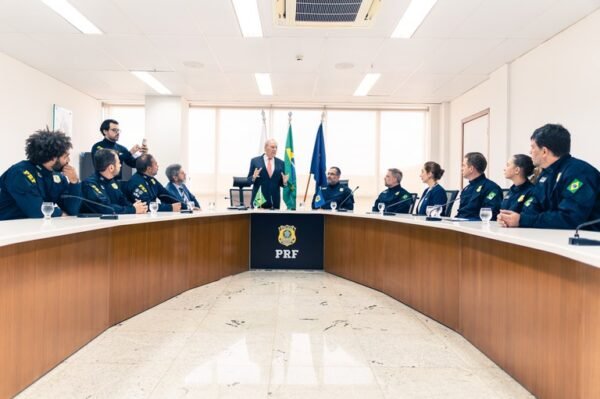The proposed amendment to the Constitution (PEC) prepared by the Minister of Justice, Ricardo Lewandowski, to give the federal government more power in the area of public security proposes transforming the Federal Highway Police (PRF) into the Ostensive Federal Police.
This Content Is Only For Subscribers
To unlock this content, subscribe to INTERLIRA Reports.
New Positions
This would be the most sensitive point of the PEC, precisely because it depends on restructuring, expansion, and, even, the probable creation of new positions. According to government assistants, there is an initial calculation of 3,000 new positions.
The Proposal
The proposal establishes the general guidelines on how the Union could coordinate public security. The details of how this would be put into practice would be left to future regulations. Government members cite the possibility, at this time, of regulating a unified system for recording occurrences and facilitating the integration of state data.
End of PRF
The text extinguishes the existence of the PRF and the Federal Railway Police – which, despite appearing in article 144 of the Constitution, never left the drawing board – and includes in the Constitution the creation of the Federal Ostensive Police (POF).
Function of POF
These new police would operate on highways, railways, waterways, and federal facilities. The text also authorizes the possibility, on an emergency and temporary basis, of assistance to state security forces, when requested by governors.
Susp
The PEC incorporates the Unified Public Security System (Susp) into the Constitution, giving the federal government the power to create mandatory guidelines for the states. The intention is not to remove the autonomy of state police forces but to create a minimum standard to be followed by all.
Involved in Controversies
In recent years, the PRF has been at the center of several controversies. In 2022, Genivaldo de Jesus Santos was asphyxiated in the trunk of a vehicle during a corporation approach. A year earlier, the PRF also participated in the operation coordinated by the Military Police that culminated in the deaths of at least 23 people. It also increased the number of bus approaches on the day of the second round of elections, violating a decision by the TSE (Superior Electoral Court) that had prohibited operations involving public transport.
Other Important Points
Strengthening the PF: Constitutionally assign the PF the investigation of criminal organizations and private militias with interstate and international repercussions.
Funds: Unify the National Public Security Fund and the National Penitentiary Fund, allowing resources from the public security fund to also be used in the prison system.
Prison System: The prison system would be coordinated by the federal government, giving the Union the power to create mandatory minimum guidelines for the states.
Occurrence registration: Requires all states to use a unified system for registering occurrences, facilitating access and integration of data between states.
Body cameras: Make it mandatory for states to adhere to the body camera program guidelines, in addition to other guidelines that may be established by the department.
Protocols: Standardization across the country of training courses, recycling, and approach protocol. There is a demand from the Inter-American Commission on Human Rights to have police approach protocols.
Analysis:
The proposed amendment to the Constitution (PEC) prepared by the Minister of Justice to transform the Federal Highway Police (PRF) into the Federal Ostensive Police (POF), represents a significant attempt to reorganize the public security in Brazil and aims to strengthen the response capacity of the State in strategic areas. However, this restructuring will require a large financial and administrative investment, in addition to facing possible resistance from sectors that may lose autonomy or influence in the new arrangement.
The incorporation of the Unified Public Security System (Susp) into the Constitution, with the possibility for the federal government to create mandatory guidelines for the states, seeks to unify and standardize security procedures across the country. Although this measure could increase efficiency and integration between state and federal security forces, there is a risk of excessive centralization, which could undermine local autonomy and generate conflicts of jurisdiction.
Sources: O Globo, A Folha de SP.




